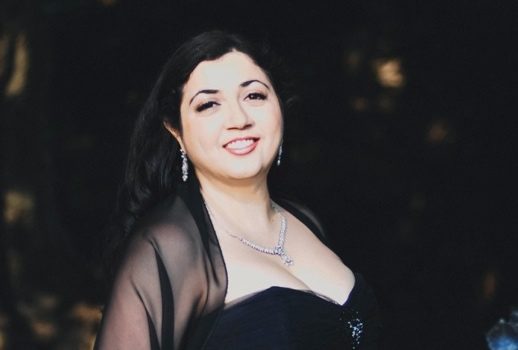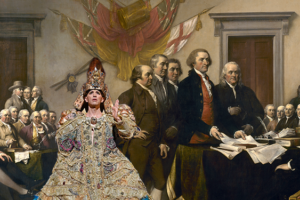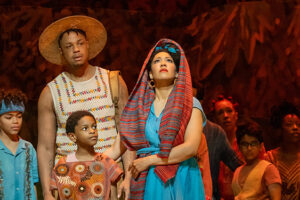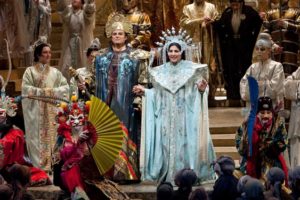

Sherezade Panthaki, a “lush” Atalanta at Caramoor.
After twenty productive seasons Will Crutchfield and the Caramoor Festival parted ways with Crutchfield and bel canto decamping to elsewhere in Westchester—the campus of SUNY Purchase–under the new rubric Teatro Nuovo which opens its first season this Saturday. Wanting to keep opera part of its programming, Caramoor went in an interesting direction importing the venerable West-Coast period orchestra Philharmonia Baroque to perform Atalanta, an obscure pastoral work by Handel, which made for a pleasant if slight diversion on a cool but humid Sunday afternoon.
An opera d’occasion written for the wedding of Frederick, Prince of Wales to Augusta, Princess of Saxe-Gotha. Handel’s work arrived late and neither of the now-newlyweds showed up for the 1736 premiere although the King and Queen did. It was never revived after its first year until the late 20th century probably because its score is far from top-tier Handel.
As might be expected the libretto not so subtly upholds the class status quo wherein the disguised Princess Atalanta and King Meleagro after going through some weak-tea misunderstandings end up together while Irene the real shepherdess who has fallen for “Tirsi” (Meleagro’s bucolic alter-ego) must make do with Aminta, a shepherd.
Given the plot’s foregone conclusion and the composer’s only intermittent engagement with these trifling entanglements, I couldn’t help but wish that conductor Nicholas McGegan and the Caramoor powers-that-be had chosen a more potent Handel rarity like Poro, Lotario or Admeto which the conductor led during his tenure at the Göttingen Handel Festival.
One unusual feature of Atalantais that its hero and heroine are both sopranos—roles written for Handel’s prima donna of the time Anna Strada del Po and the castrato Gizziello. Irene is a contralto and her lover Aminta a tenor, also atypical casting. Cécile van de Sant and Isaiah Bell as the latter couple had perhaps the more grateful music.
Her lightly cruel teasing was charmingly done particularly in “Come alla turturella” (Just as the turtle dove) during which a handy Katonah songbird piped up on cue with a descant. Bell started out a bit rough and cloudy but settled down excelling in “Diedi il core,” his chance to needle Irene in return.
Philip Cutlip in the unnecessary role of Irene’s father Nicandro displayed a fluent and jovial baritone while booming bass-baritone Davóne Tines as Mercurio showed up at the last minute to handily dispatch one of those seven-minute arias that exist mostly to delay the denouement.
His attractive coloratura, heard to greater effect last year in Handel’s Aci, Galatea e Polifemo, might have made more of an impact with sharper attack and more enticing ornamentation, but then da capo embellishments all afternoon were far too conservatively spare and dull.
As the lovers, Sherezade Panthaki and Amy Freston presented a frustrating conundrum. Panthaki sang boldly with a shining voluminous soprano as Atalanta, where the semi-heroic castrator ole of Meleagro went to the more recessive Freston.
While the latter displayed a finely agile florid technique, she didn’t quite have the “big guns” to pull off Meleagro’s bravura showpiece “Non sarà poco” which concluded the first act. Also her tight top was tested in a role with the highest tessitura of any Handel castrato role—touching a high C on occasion
One wondered if they might profitably have switched roles. Panthaki ornamented considerably more than anyone else although her final cadenzas sometimes struck me as excessive. Her traversal of Atalanta’s numerous arias made one wish they were finer pieces; “Se nasce un rivoletto” which should bring the second act to a bracing conclusion just isn’t that compelling.
Her finest solo moment was “Lassa! ch’io t’ho perduta” which showed off her lush instrument well although one generally wanted clearer words. She and Freston though both excelled in the opera’s finest music—their two glorious duets.
McGegan’s conducting was peppy as always; one was rarely surprised or seduced but one could always count on temperate and polished playing although the recalcitrant horns had an erratic afternoon. Another unusual feature of Atalanta is a chorus which contributes to the celebratory verses for the newlyweds that concludes the opera. A contingent of the NYC choral group TENET did its duty with piping verve.
Though most might claim to have never heard Atalanta I would wager that everyone has heard Meleagro’s entrance arioso “Care selve” which has been grabbed up for years as one of those arie antiche many singers use to open a recital.
One may find on YouTube versions by artists from Kathleen Battle to Luciano Pavarotti but Joan Sutherland’s mushy-mouthed 1961 rendition with trills galore introduced and accompanied by Gerald Moore (who blithely dismisses the “song’s” text) is particularly inviting.
As far as I know the late Alan Curtis never performed or recorded a complete Atalanta but he did select those two Atalanta-Meleagro duets for CDs—the second act’s with Patrizia Ciofi and Joyce DiDonato…
and the more sensuously competitive one for his final CD with Christiane Karg and Romina Basso.
Just when I was thinking that no one else EVER does Atalanta I learned it will be staged next week (!) directed by tenor Kobie van Rensberg and conducted by Michi Gaigg leading her L’Orfeo Barockorchester. The production will be also seen at the 2019 Halle Handelfestspiele.
Although McGegan’s Handel discography features an acclaimed Ariodante with Lorraine Hunt Lieberson,he has long tended to champion Handel’s more rarely performed works. On Hungaroton in the 1980s, besides his first Atalanta, he set down Il Pastor fido and Floridante. Teseo was the opera he and PB performed on their most recent Handel visit in the New York area, and an excellent CD of highlights has been released on the group’s own label.
It has also issued McGegan’s second complete Atalanta from 2005 (again featuring van de Sant and Cutlip) which is worthy of attention though the singing is not quite as consistently accomplished as Sunday’s Caramoor afternoon.
The orchestra’s most recent CD release, Rameau’s La Temple de la Gloire, is a valiant effort but unfortunately not recommendable.
While McGegan and this band are in fine form, the solo and choral singing prove sadly uneven particularly the female leads. Especially harsh and unwieldy is Chantal Santon-Jeffery in three roles; unfortunately she seems to be a necessary feature of every French baroque performance or recording these days.
The sound quality is uneven and picks up a lot of stage noise and a very vocal and enthusiastic audience which whoops and hollers a bit too often. While this recording is the first to feature the complete original edition of the Rameau/Voltaire work, a slightly shorter version by Guy van Waas on Ricercar is definitely preferable, as is a much earlier recording (never released on CD) by the recently deceased Jean-Claude Malgoire which features the particularly inspired American bass Gregory Reinhart.























Comments